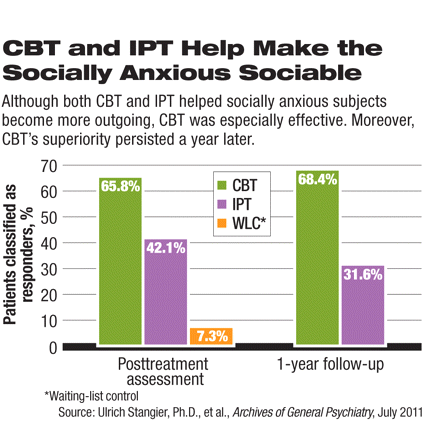Both cognitive-behavioral therapy (CBT) and interpersonal therapy (IPT) can help people with social anxiety, but CBT appears to be especially effective, researchers have found.
The lead researcher was Ulrich Stangier, Ph.D., a psychologist affiliated with the University of Frankfurt in Germany. Results appeared in the July Archives of General Psychiatry.
The CBT regimen tested, Stangier explained to Psychiatric News, "was designed to help socially anxious people correct distorted, negative beliefs about their social worth. There was a strong emphasis on learning through action. Subjects were encouraged to test their negative beliefs in behavioral experiments as well as through discussion in therapy sessions."
One of the subjects who received this CBT regimen, Stangier said, was a man fearful of public speaking. His anxiety appeared to hark back to a childhood situation he described in which a teacher humiliated him in front of other pupils. One of his CBT assignments was to verbalize his memories of the humiliation in detail, discuss the personal meaning of the humiliation, then modify the personal meaning in subsequent guided imagery.
Another CBT assignment was, while giving a real-life lecture, to pause, then look to see whether people in the audience were laughing or otherwise acting negatively toward him. They were not, he found. Such exercises "finally brought him complete relief from social anxiety," Stangier reported.
The IPT that he and his colleagues tested was, in contrast, designed to help subjects become more comfortable and assertive in social situations and to learn how to form close and trusting relationships with others, Stangier said.
He speculated on why he and his colleagues found CBT to be somewhat more effective than IPT for social anxiety. "It may be because it tackled aspects of greater relevance to the origin of social anxiety disorder than IPT did," Stangier suggested. "In other words, it is possible that a lack of assertiveness and a deficit in forming trusting relationships cannot be modified if basic beliefs about the self and the perception of others are not changed."
The trial conducted by Stangier and his group took place at two research centers, one of which specialized in CBT, while the other specialized in IPT. Therapists at each site were trained to conduct both treatments. The cohort consisted of 117 subjects with a primary DSM-IV diagnosis of social anxiety disorder who had been recruited from various sources—for example, psychiatrists' and psychologists' private practices, ads in local papers, or ads on the Internet.
Subjects were randomized to receive 16 individual, usually weekly sessions of CBT or 16 individual, usually weekly sessions of IPT; or to serve as waiting-list controls during the treatment period. After the series of treatment sessions were completed, all subjects were evaluated for social anxiety. The primary outcome measure was the Clinical Global Impression Improvement Scale, and assessments were made by independent masked evaluators.
Both CBT and IPT were found to be significantly more effective than wait-listing. Specifically, 66 percent of subjects treated with CBT showed marked or moderate improvement in social anxiety symptoms, compared with 42 percent of those treated with IPT, and with 7 percent of control subjects. At the one-year follow-up, the superiority of CBT over IPT persisted with significantly higher response rates in the CBT versus the IPT group (68 percent versus 32 percent). (The control subjects were not evaluated at the one-year follow-up.)
The trial was funded by the German Research Foundation, the Wellcome Trust, the South London and Maudsley National Health Service Foundation Trust, and King's College, London.

